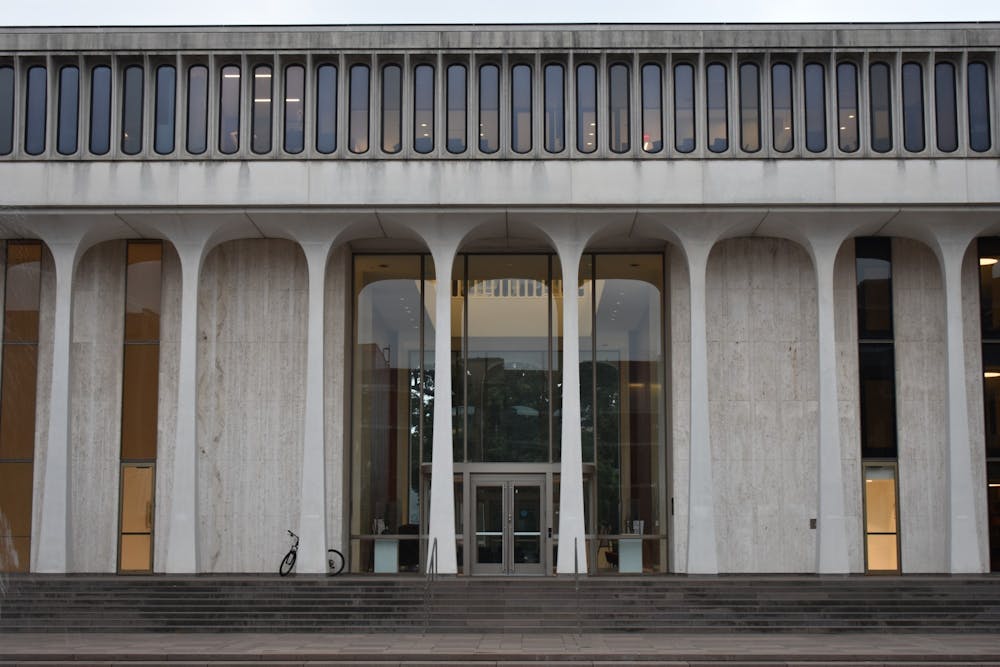Alexander Kmentt, an ambassador from the Austrian Foreign Ministry, spoke at a public lecture presented by the Program on Science and Global Security and the Princeton School of Public and International Affairs (SPIA) on Tuesday, Oct. 25.
The lecture, hosted in Robertson Hall, discussed the possibility of nuclear escalation in Ukraine and The United Nations Treaty on the Prohibition of Nuclear Weapons (TPNW). The TPNW is a treaty adopted by a U.N. conference that prohibits partaking in nuclear weapon activities.
During an interview with The Daily Princetonian, he also addressed the Princeton community’s responsibility to continue studying and discussing the risks of nuclear weapons, as well as the need for students to organize in the face of this political issue.
Ray Acheson, a leader in an international campaign to abolish nuclear weapons, introduced Kmentt as the president of the First Meeting of States Parties to the TPNW during the lecture, describing Kmentt’s work with “the academic community, including many people here at Princeton” as “one of incredible collaboration and cooperation and also camaraderie.”
Kmentt began his lecture by quoting famed former Princeton lecturer Albert Einstein. “Through the release of atomic energy, our generation has brought into the world the most revolutionary force since prehistoric man’s discovery of fire,” he said.
Kmentt then turned to a discussion of the current nuclear threats made by Russian President Vladimir Putin in the context of escalating war in Ukraine.
“All of us need to realize with urgency that the nuclear weapons issue is back as a central and existential threat to the survival of humanity,” Kmentt said.
“Nuclear deterrence theory postulates the requirement of credible nuclear strike and counterstrike capabilities to impose unacceptable costs on an adversary,” he added.

Nuclear deterrence refers to the theory that if one actor extends a limited threat of force, other parties are less likely to escalate action. Kmentt explained, however, how trusting the theory can pose great risk given it cannot be proven that deterrence has worked in the past or will work in the future.
Instead, Kmentt advocated for the TPNW, a humanitarian initiative that moves away from the assumptions of nuclear deterrence. This new way of thinking sets the TPNW apart from traditional views of nuclear weapons. According to Kmentt, the treaty notes how the catastrophic consequences of nuclear weapons transcend national borders and pose grave implications for human survival, the environment, socio-economic development, the global economy, and food security.
“The TPNW is, especially in the current circumstances, an indispensable ray of hope and a precious treaty against an otherwise very bleak backdrop,” Kmentt concluded.
In an interview with the ‘Prince,’ Kmentt addressed the responsibilities of the Princeton community as a research institution.

“I think that it’s really important specifically for universities to look at the evidence that has been developed,” he said. “The more we understand the complexity of these risks and consequences, how grave they are and how they interrelate, the more it actually makes the case for the abolition of these weapons.”
At the end of the interview, he urged students to “get organized.”
“Nuclear war is climate change in a pressure cooker,” Kmentt said. “I hope for the next generation to do better than my generation.”
Jackie Zhou is a first-year from New Jersey who writes for the news and newsletter sections of The Daily Princetonian. Please direct any corrections requests to corrections@dailyprincetonian.com.








